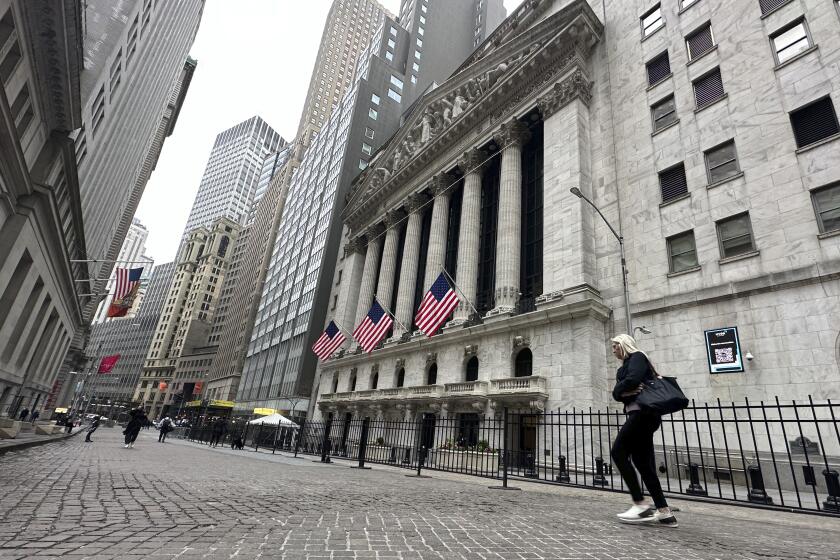Stocks dive amid global pessimism
Reemerging fears of a global economic slowdown sent stocks around the world tumbling Wednesday, pushing key U.S. market indexes back into the red for the year.
One day after the Federal Reserve downgraded its assessment of the American economy, discouraging reports from Asia and Europe unnerved investors and revived concerns that economic growth prospects were fading.
Some investors dumped stocks in favor of the perceived haven of government bonds. The rush for safety also drove the dollar up sharply against most other currencies and lifted gold.
On Wall Street, the Dow Jones industrial average slumped 265.42 points, or 2.5%, to 10,378.83, the biggest one-day drop for the blue-chip index since July 16.
Broader U.S. indexes suffered larger declines. The average New York Stock Exchange issue slid 3.3%, the worst daily loss since June 4.
“We continue to see more and more evidence shading down the growth prospects for the economy,” said Anthony Chan, chief economist at JPMorgan Private Wealth Management. “We still have a cushion — but the cushion is getting thinner and thinner.”
On Wednesday, China said its industrial production in July was up 13.4% from a year earlier, a strong pace but the slowest gain in 11 months. The country’s central bank also reported a decline in bank lending last month from June.
Beijing has been actively trying to rein in sectors of its economy, particularly real estate. But any loss of momentum also threatens growth around the world because China has been a major driver of the global economy.
In Europe, the Bank of England on Wednesday cut its economic growth estimates for Britain through 2011, citing in part expected government budget cuts to reduce deficit spending.
Stocks tumbled 2.4% in Britain and also fell broadly across Europe, with the German market down 2.1% and France off 2.7%.
In the U.S., the stock market opened to news that America’s trade deficit widened in June as imports rose while exports fell. The larger deficit is likely to mean that the U.S. economy grew at an even slower annualized pace in the second quarter than the government’s initial estimate of 2.4%, analysts said.
Stocks plunged at the opening on Wall Street and stayed down the rest of the day. The Standard & Poor’s 500 index ended the day down 2.8%, or 31.59 points, to 1,089.47. The tech-heavy Nasdaq composite index slumped 3%, or 68.54 points, to 2,208.63.
Analysts noted that the Federal Reserve had set the scene for renewed concerns about economic growth after the central bank on Tuesday said it expected the U.S. economy’s recovery to be “more modest in the near term than had been anticipated,” in large part because of the stubbornly high levels of unemployment.
To underpin the recovery, the Fed said it would resume buying Treasury securities in an attempt to put more downward pressure on long-term interest rates.
On Wednesday, spooked investors followed the Fed’s advice about buying government bonds: A rush of money into Treasury issues sent the yield on the 10-year T-note to a 16-month low of 2.68% from 2.77% on Tuesday.
Government bond yields also slid in Germany, Britain and Canada, among other countries, as investors sought a haven.
Some analysts said the central bank didn’t help investors’ confidence with its new assessment of the economy on Tuesday.
“We know the economy is weak, but putting it in front of everybody’s eyes is not very consoling,” said Maria Ramirez, economist at MFR Inc. in New York. “The truth hurts.”
Others said the Fed’s plan to buy Treasury bonds was a weak response to the slowing economy.
“The markets want to see support from policymakers,” said Steve Ricchiuto, the chief economist at Mizuho Securities. “The Fed opted to go instead for the minimalist path. They basically just decided to keep policy where it is.”
Recent economic reports have mostly indicated that the U.S. economy still is growing — making a double-dip recession unlikely in the near term. But there is now overwhelming evidence that the pace of the recovery is slowing.
The new doubts about the global economy are only the latest to rock the markets this year — and some economists say they will prove to be as overblown as the fears in the spring about a European economic meltdown.
“Each new concern about the recovery seems to be disproved, but then the markets focus on a new worry,” said Christopher Rupkey, an economist at Bank of Tokyo-Mitsubishi in New York.
The markets have spent much of the last month climbing after reaching a low for the year in early July. By the end of last month, spurred on by good earning reports from American companies, leading indexes climbed above the levels where they began the year.
Wednesday’s declines take all of the leading indexes back into the red for the year.
The Dow now is off 0.5% for the year. The S&P 500 is down 2.3%.
nathaniel.popper@latimes.com
tom.petruno@latimes.com






